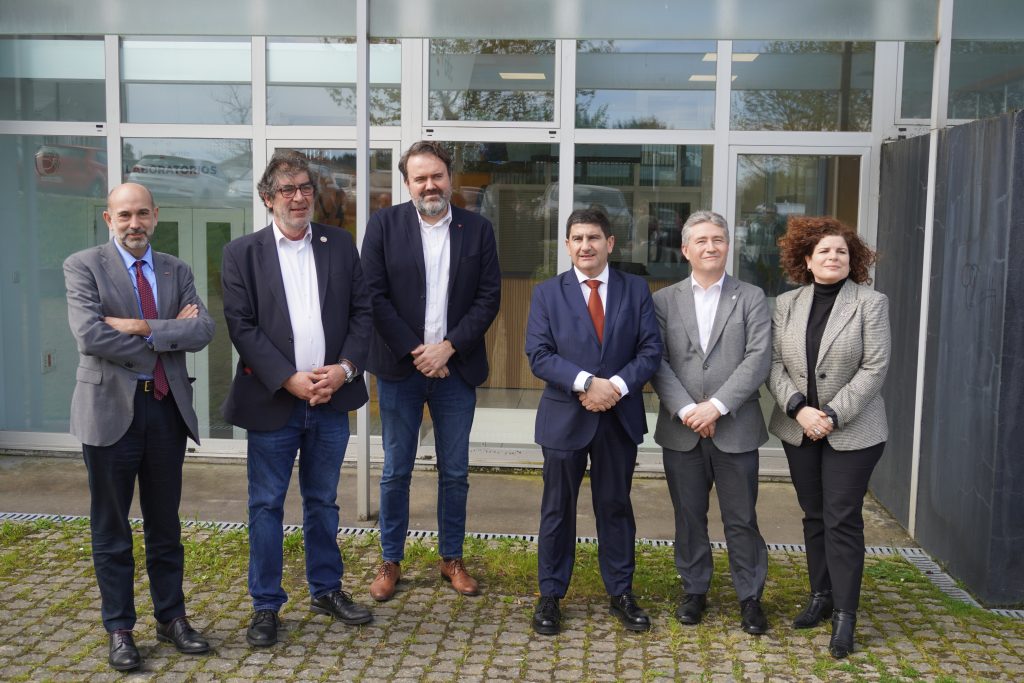
CITIC of UDC receives the visit of the Secretary of State for Youth and Childhood
- Literacy in AI, early detection of cyberbullying, and the promotion of STEM vocations were some of the pioneering initiatives presented today to the Secretary of State for Youth and Childhood, Rubén Pérez Correa, at the working meeting held at the Information and Communication Technology Research Center of the Universidade da Coruña.
- The development of AI tools and content in the educational field is one of the key strategies being carried out by the center through various lines of research.
A Coruña, April 5, 2024.- The Information and Communication Technology Research Center (CITIC) of the Universidade da Coruña received this Friday the visit of the Secretary of State for Youth and Childhood, Rubén Pérez Correa, who was able to learn firsthand about innovative projects and programs promoted by the center, through which the use of technology, and more specifically, Artificial Intelligence, is being promoted from an inclusive and equal perspective. The Secretary of State held a working meeting with ten researchers from the center who lead initiatives whose scope of action is education, childhood, and youth.
“As a research center, our mission is to promote technological innovation with an inclusive approach, ensuring that everyone, regardless of their condition, can benefit and fully participate in the advantages offered by ICT and AI,” said CITIC director Manuel Penedo, who highlighted the center’s commitment to initiatives that “have made us, for example, a reference at the Galician and national level in the care of people with disabilities through ICT”.
A work that was highlighted by the Secretary of State for Youth and Childhood, Rubén Pérez Correa, who stated that “this visit is an opportunity because at CITIC there are a number of very interesting projects within the competencies of our ministry” and highlighted the initiatives related to “AI, cyberbullying, and also projects for the identification of migrant children, a topic that is urgent because we need tools that are not just medical tests, so these tools being developed by CITIC are strategic”.
For his part, the rector of UDC, Ricardo Cao, thanked the Secretary of State for his visit to UDC, which “allows us to show him the projects we are carrying out in the field of information technologies. It is an example of how ICT, which we often see as generating problems, help a lot, also in childhood and youth”.
Education and Artificial Intelligence
AI training for young people was another topic discussed during this visit by the Secretary of State. CITIC of UDC has several projects through which outstanding content, programs, and tools have been developed precisely in the educational field at all levels, from Primary Education to University. Researcher Francisco Javier Bellas spoke about the center’s leadership in projects promoting AI literacy at the European level and the work developed as part of the Working Group of the Consellería de Educación, which designs the curricular content of AI subjects. They also collaborate in the “Polos Creativos” program of the Xunta de Galicia to create an AI Kit (Kitia), aimed at Primary and Secondary students, which introduces basic concepts of machine learning and ethical use of AI and was presented by Óscar Fontenla, a member of CITIC.
In addition to training both students and teachers, CITIC also promotes the encouragement of STEM vocations among young people through programs such as “Talentos Inclusivos,” led by Javier Pereira, deputy director of the research center; or outreach projects such as “Inspira Steam,” coordinated in A Coruña by researcher Verónica Bolón, or the STEMbach program, coordinated by Susana Ladra, which also promote greater participation of women in science and technology careers. Researcher Adriana Dapena introduced the outreach and promotion of technological vocations carried out in collaboration with MUNCYT.
Cyberbullying, health, and well-being
During his visit to CITIC of the Universidade da Coruña, the Secretary of State for Youth and Childhood also learned about other ICT projects that address issues related to the health and well-being of young people. This is the case of a technology aimed at understanding lifestyle habits and understanding the causes of sedentary behavior or inactivity, which Raúl Fraguela, a teacher at the Faculty of Education Sciences of UDC, is working on, as well as its consequences on the development of children.
For his part, CITIC researcher Fidel Cacheda presented AI models for the early detection of cyberbullying on social networks, which are currently being worked on. Verónica Robles, a teacher at the Faculty of Physiotherapy, spoke about the project that seeks to improve arm functionality in children suffering from hemiparesis through portable technology. Óscar Ibáñez, a member of CITIC, explained the development of software to estimate the legal age of unaccompanied migrant minors.





